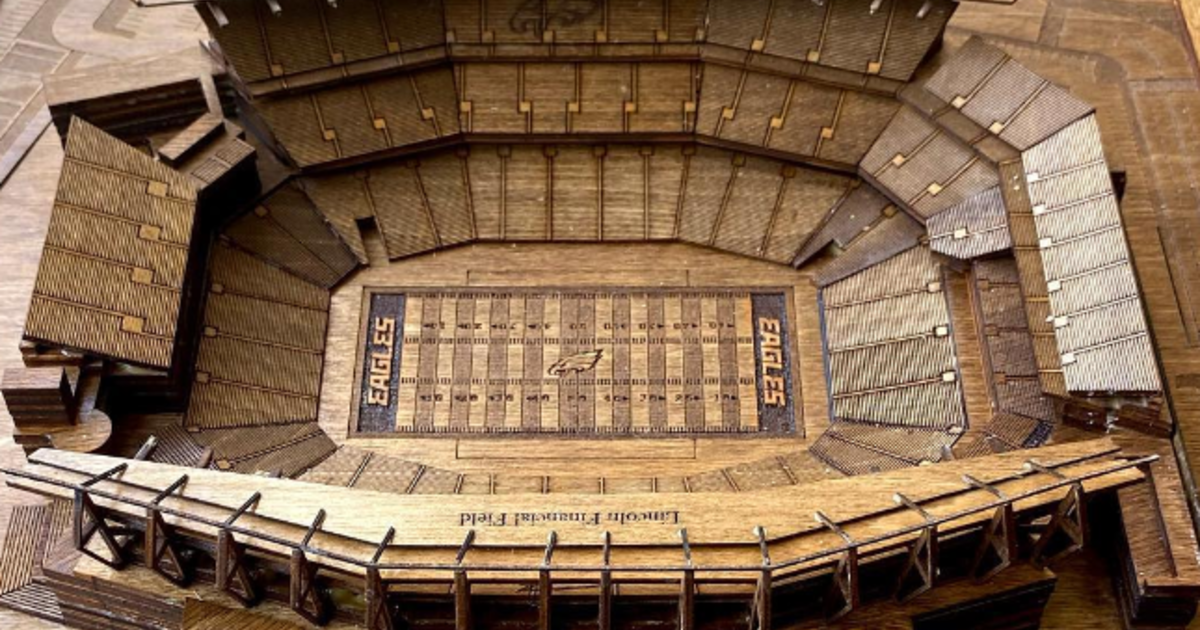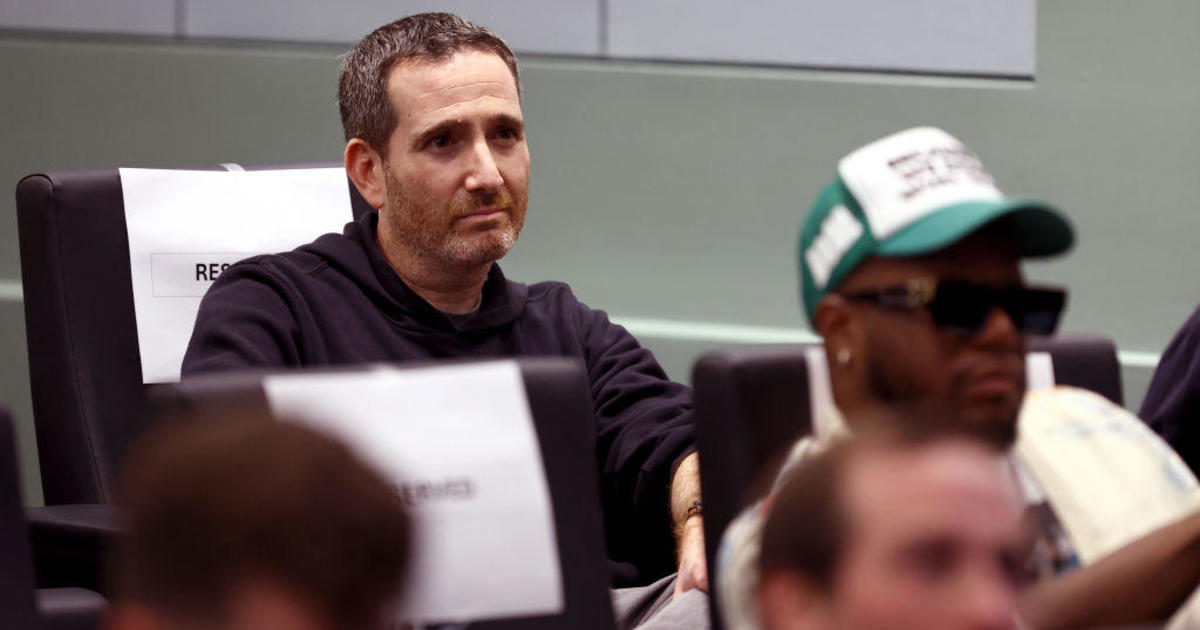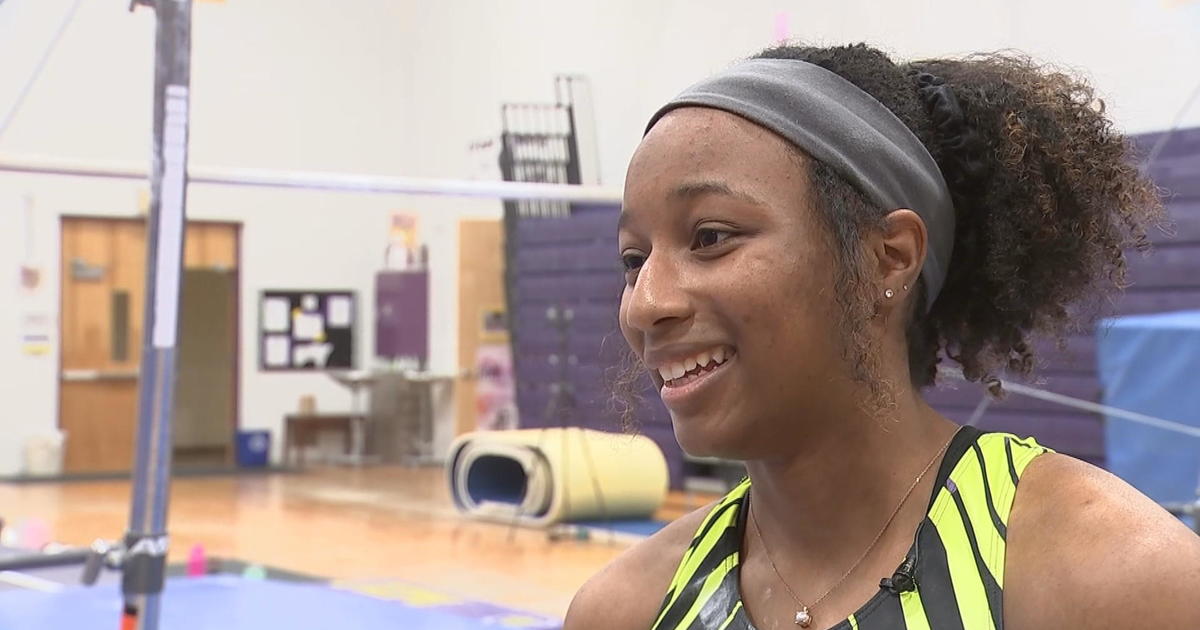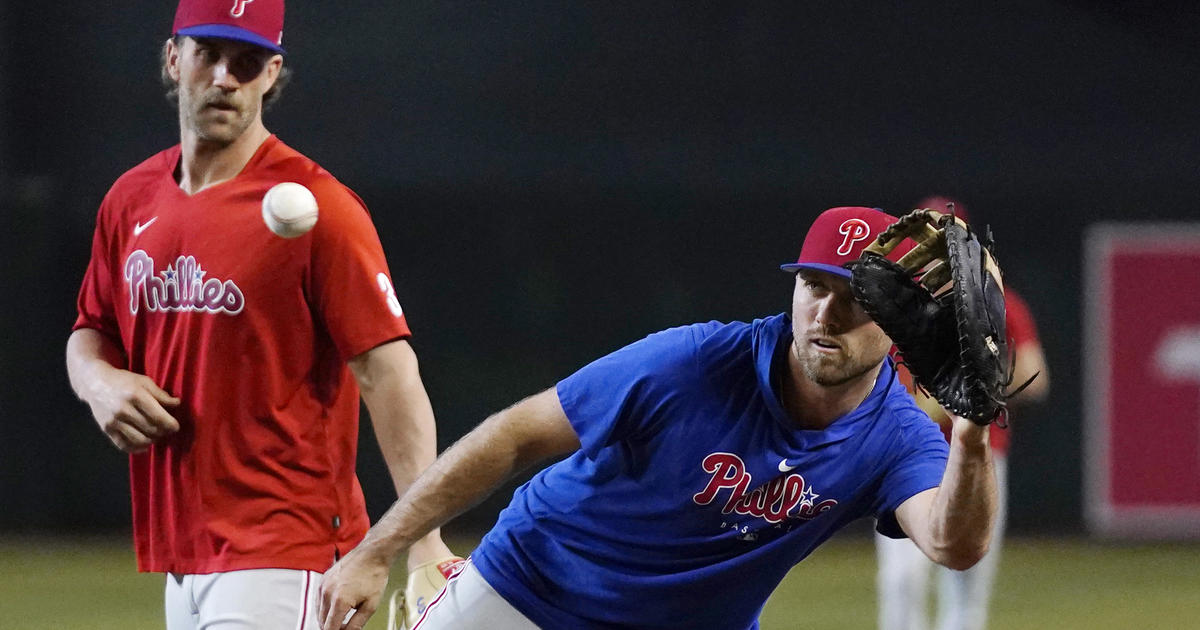Boxer Claressa Shields Makes History In Winning Gold Medal
By Joseph Santoliquito
LONDON, ENGLAND (CBS) — She would sneak through one of the back doors, a shadowy figure trying to meld into the brittle concrete walls, drawn by curiosity to the bare-bones gym down the street and its makeshift blood-stained ring squatted diagonally across the cracked basement floor of the Berston Field House.
Young children interspersed with teenagers would be shadowboxing in front of the large mirror that consumes a far wall, and others would be hitting the various heavybags hanging from the creaky wooden rafters. Whomp! Whomp! Whomp! The tiny place would rattle each time a gloved fist struck a swinging bag — and Claressa Shields' eyes would flare open in wide wonder at everything surrounding her.
It was too magnetic. Too enthralling. Too engrossing to turn away. Shields had to do it. She had to find out more. She'd nag her father, Clarence, a former amateur fighter known as "Cannonball" who was vehemently against his 11-year-old daughter stepping into a gym filled with boys who had no qualms about punching his little girl in the nose.
So Shields would keep sneaking down Saginaw Street in Flint and find her way into Berston. She would go down the steps and slip through one of the side doors. She did it, until one day, her father had enough and took her down there himself — introducing her to Jason Crutchfield.
If there was an epiphany in Shields' young life, that was it. She always could look back on that day, the time she was formally introduced to boxing. The day that changed everything for a girl once filled with rage and anger over her domestic plight, to now a 17-year-old senior at Northwestern (Flint, Mich.) making history as the first of three American women to represent her country on the U.S. Olympic boxing team.
Now Shields is an Olympic gold medalist, easily defeating Russian Nadezda Torlopova, the tournament's No. 2 seed, 19-12, in the gold medal match to become the first U.S. fighter since world super middleweight Andre Ward captured gold in 2004 in Athens as a light heavyweight.
At 17, Shields also became the second-youngest boxer to ever win an Olympic gold medal in boxing. She also made U.S. history by becoming the first female to win an Olympic gold medal in boxing.
Shields was already the youngest Olympic boxer since 16-year-old Davey Armstrong made the 1972 team that competed at the Munich Olympics. A 165-pound middleweight, she will join flyweight Marlen Esparza and lightweight Queen Underwood in London for the 2012 Olympiad, which begin Friday.
Her path there wasn't an easy one. In her first international competition in April at the Continental Championships in Canada, Shields crushed reigning world champion Roseli Feitosa of Brazil, and handily defeated Canadian Mary Spencer, a three-time world champion, by 27-14 decision. Her amateur record is a daunting 26-1, with her lone loss a 14-8 setback to Great Britain's Savannah Marshall in the second round of May's World Amateur Championships in China.
The 5-foot-11 Shields is fearless, gregarious, radiant, charismatic, relentless and above all aware of the history she is making. She'll be the youngest female boxer in the field. Marshall is 21. Spencer is 27. Feitosa is 23.
Before they step into the ring, they'll primp and braid their hair as if readying for a commercial shoot. Shields could care less. Her hair, so what? Makeup, what's makeup? Just point her in a direction and she's good.
Shields shocked everyone, with the exception of possibly herself and Crutchfield, when she devoured Spencer. At the time, Spencer was the No. 1 female amateur middleweight in the world. A three-time world champion, Spencer was the fighter who most felt would be a gold-medal favorite in London.
Shields changed all of that, while announcing herself as a world player.
"I remember everyone cheering for her, and Spencer being announced as this three-time world champion and all of that other stuff, and here I am," Shields said with a laugh. "I remember someone who saw the fight on TV, and underneath my name on the screen, it said, 'Relative unknown.' I was like 'What?' That was funny. That told me I was a good fighter when I beat Spencer. I know that shocked a lot of people, and sometimes, I shock myself."
Shields isn't an international unknown anymore. But can she do it? Can she win a gold medal?
"Claressa is very capable of doing it," said Crutchfield, who has been Shields' coach since she first walked into Berston. "I'll accept a silver or bronze, but we want the gold. It depends on the draw and who we're going to open with. Age and experience doesn't matter to Claressa. She's faced all of the best in the world already, she's been there, so she won't see anything she hasn't seen before. She'll get in there against someone and it's like she's the one teaching. She's a fast starter."
Shields has avid fans among her Olympic teammates, especially Rau'shee Warren, the first three-time U.S. Olympic boxer and adjunct U.S. team leader. He's literally watched Shields grow up in the close-knit, insular world of amateur boxing.
"Claressa's work ethic, with her just being 17, is amazing," Warren said. "When I see her in the gym, she throws combinations and shots like men. I tell her if I ever got in the ring with her, I'd have to hit her for real, because she has skills that can be great and hurt you. Training is the hard part, and she's very committed to that. By the time she gets in the ring, everything will be easy for her in London. She drives herself. She has a chance to shock the world. I really believe that."
Shields fights with a controlled fury. Her target is Marshall, and it gnaws at her that though it appears on a tape of their fight that Shields outhit her, it was Marshall's connects that caught the eye of the five judges.
"I know what I'm up against," Shields admitted. "I'm going to Marshall's home country, and I'd really like to smash her. But all of those girls are on my hit list, too. Losing to Savannah Marshall, that hurt. I know I beat her. She doesn't know what's coming at her again. I gave her a hard time, and I still don't know how she got the decision.
"But believe me, the loss helped me and made me work way harder in the gym. When I get tired, I push harder. I'm going to the Olympics and if I even have a chance to run into her again, it's over. I'm telling you it's over. I'm not letting her breathe. They're all older than me, and more advanced, but I think I'm stronger than all of them. We'll see what happens. I'm going to London to win and take home a gold medal."
Crutchfield would watch her from the corner of his eye. He introduced her to the proper way to punch, how to hit the speedbag and heavybag, yet he wasn't exactly ready to commit to the lone girl in his small gym. Crutchfield, 48, an old-school trainer who had a solid amateur career and 7-1-1 record as a pro lightweight, wasn't too keen on girls in his place.
Here was this girl. A girl boxing?
"It's why I stayed away for a little while, until a few weeks in. Call me old-school that way, but then Claressa kept coming back, and coming back," Crutchfield said. "I gave her to somebody else that first time. It took me two weeks to notice her. She had a lot of fire and desire to learn and do well. That's what caught my attention. Once I saw she was serious about it, that she was committed, that's when I committed to her."
Boxing caught Shields' attention. It was a refuge, because prior to boxing, no one really noticed her. Her father was incarcerated for a time and a sporadic presence in her life, while her mother was a transient figure in her early years. Shields' grandmother took her in when she was 6. But the little girl was always being picked on, for what clothes she wore, for her hair, for her quiet demeanor, for the way she looked.
She was called ugly.
She was bullied.
Through time, those experiences filled Shields with an uncontrollable temper. There wasn't a street fight she could avoid. It didn't matter if it was boys or girls going at it: Shields was habitually in the eye of the street storm.
"I was always mad; I thought I was invisible and that I didn't matter," recalled Shields tranquilly, looking down. "I used to shut off the world. I was a troubled kid. I was. I was bullied a lot when I was younger. I don't like to remember those times. I used to get called ugly because of my hair, my clothes, everything. I was lost, and I didn't think there was anyone out there who could help me."
Shields then began lashing out. She developed an attitude. She was tired of being pushed around and began pushing back. In fifth grade, a girl lied to Shields and she threw a chair at her. Another time she stood up for her brother, which got her into more trouble. But the worst was when she wound up in the back of a police car in sixth grade. Shields had shown up to school to defend her sister over a dispute with another girl, but because she was suspended, Shields was not permitted on school property.
"I was so young and naive that I was laughing. I remember sitting in the back of the police car laughing. It wasn't cool, but I didn't care," Shields recalled. "I look back at those times and the only thing I worried about is what my granny thought. When I would get angry, she'd tell me to go outside and sit on the porch. But the time they took me in the police car, facing my granny in the police station, that's when it stopped. It kind of hit me."
It's also when boxing converged and became more important. Reluctant at first, Crutchfield took Shields in and began having her spar against boys her age. Most of the time, she held her own. Crutchfield was determined to treat her no different from any of his other fighters — and Shields didn't want any special treatment because of her gender.
Turns out, Crutchfield's job was just beginning. He recognized the fury boiling within Shields. It was up to him to channel it, steer it into a positive direction. There were many times he had to check her tantrums.
"Claressa had to get that under control. All of that crazy stuff wasn't going to work in the ring and work long-term if she was going to make it in boxing," Crutchfield said. "It took some time to shape that demeanor. She walked around with a little chip on her shoulder. Well, it was actually a big chip. I would say it took her three years to calm her down."
Her acting out took on the same theme every time.
"Something would bother her, sometimes something small," Crutchfield said. "But she would go crazy and holler and scream and raise her voice at me. I'd correct her and tell her she shouldn't talk to me or anyone else like that. Then she would go away, get herself together, calm down, come back and apologize. Oh yeah, you can say there was a lot of tough love going on and that's what she needed. She needed a little direction and a little tough love. I did a lot of both."
Around 15, changes began to surface. Shields went from the quiet, remote girl to someone who socialized with everyone in school. She no longer sits in the back of the class, but in the front. Her circle of friends has grown considerably at Northwestern — engaging everyone she crosses in the halls. She plans on playing for Northwestern's basketball and volleyball teams her senior year, of course, shaped around her boxing schedule.
She doesn't flip out over trivial things. Actually, she doesn't flip out at all. She's dealt with problems in a comfortable, mature manner.
She began believing in herself, because her adopted boxing family began believing in her. That injection of faith helped adopt more faith.
To see Shields today, and hear her sordid backstory, it's hard to imagine this affable, happy girl was once the same girl who sat giggling in a police car. She's a leader now. When she's running laps in the back of Berston, she's frequently followed by all the younger fighters in the gym — kind of like a momma hen.
Crutchfield doesn't have to remind her to run laps: She does them on her own. She has a tremendous, nonstop work ethic. Before leaving for London, she sparred with men in their early 20s at Berston, and was exceptional.
She has the kind of personality that draws people to her. Crutchfield relayed a story of when Shields and he met Heisman Trophy winner Mark Ingram, a Flint native, at a local post office.
"Mark was standing there with his mother, and I knew Mark's mother and Mark through her, so I introduced Claressa to him," Crutchfield said. "Mark was great, he wished her luck and Claressa and Mark shook hands. But this really tells you about Claressa and how funny she is, because as we're walking away, Claressa says, 'Mark Ingram's almost as famous as me.' I just laughed and told her he might have her by a little bit right now."
Now, everyone in Flint, it seems, knows Shields. She's moved in with Crutchfield and his family. Crutchfield's daughters treat her like a sister. It's given Shields a firm, stable base. She has two documentary crews trailing her, and she accepts and greets everyone as if she's known them her entire life.
She's 17 and reached a comfort zone. She's no longer angry.
"That's why I keep saying Claressa's a special kid in so many ways to survive what she survived. She didn't choose that way," Crutchfield said. "I kept pointing her in the right direction. I kept telling her she has a lot of talent and she has to use it. She has a deep faith. She talks about God a lot. She has a lot of faith in God; she has a lot of faith in me; she has a lot of faith in herself."
Shields envisions a future where one wasn't. She wants to go to college, and continue traveling the world to see where boxing ultimately takes her. It's been a good journey, a road of self-discovery and redemption.
"I have a deep faith in God and that there is a plan for me. I got baptized and I've learned how to deal with things a whole lot better than I used to," said Shields, smiling. "I'm a lot different than I used to be. My attitude and the way I conduct myself is definitely different. Boxing saved my life. It definitely changed my life.
"The attitude that I had, I had trouble. I caused as much negative things as positive things. Without boxing, who knows, I might have wound up pregnant or something, and I wouldn't be doing all of the things that I'm doing now. Everything is good that's happened to me when boxing came into the picture. I'm able to live my dreams."
Those dreams will continue in London. There was a time when she never imagined she'd get out of Flint.
Instead, she's something of a celebrity at Northwestern High School, which won Class A back-to-back Michigan state basketball championships in 1984 and '85 and produced such stellar athletes as Glen Rice, Jeff Grayer, Andre Rison and 2004 Olympic boxing bronze medalist Andre Dirrell.
School officials wanted to throw Shields a special celebration when she made the 2012 U.S. Olympic team in May, but she said no.
Instead, she wanted to be treated to McDonald's.
"That's Claressa," said Northwestern principal Cheryl Adkins, who taught Shields in middle school. "We're extremely proud of Claressa. She's an example to all of our young ladies as to what you can accomplish. I had Claressa in middle school, and she was this quiet child who was withdrawn. You knew she was there, but if she faded into a wall, she wouldn't be missed. There's been a lot to growth with her boxing. She was so into boxing she once told me she'd rather sleep in the gym, because it was far better than living at home as far as she was concerned. She looks at boxing as her way out."
Shields is taking college courses and maintaining a high-profile social life as well.
"She does a great job of juggling it all, because she has a ton of class work," Adkins said. "We're going to do something for Claressa when she gets back from London. She's still a kid. She's not into the tutti-frutti things. That's not where Claressa's head is. She's very down to earth. She just wants to be treated like everyone else."
If she comes home from London with a medal, don't count on that.



